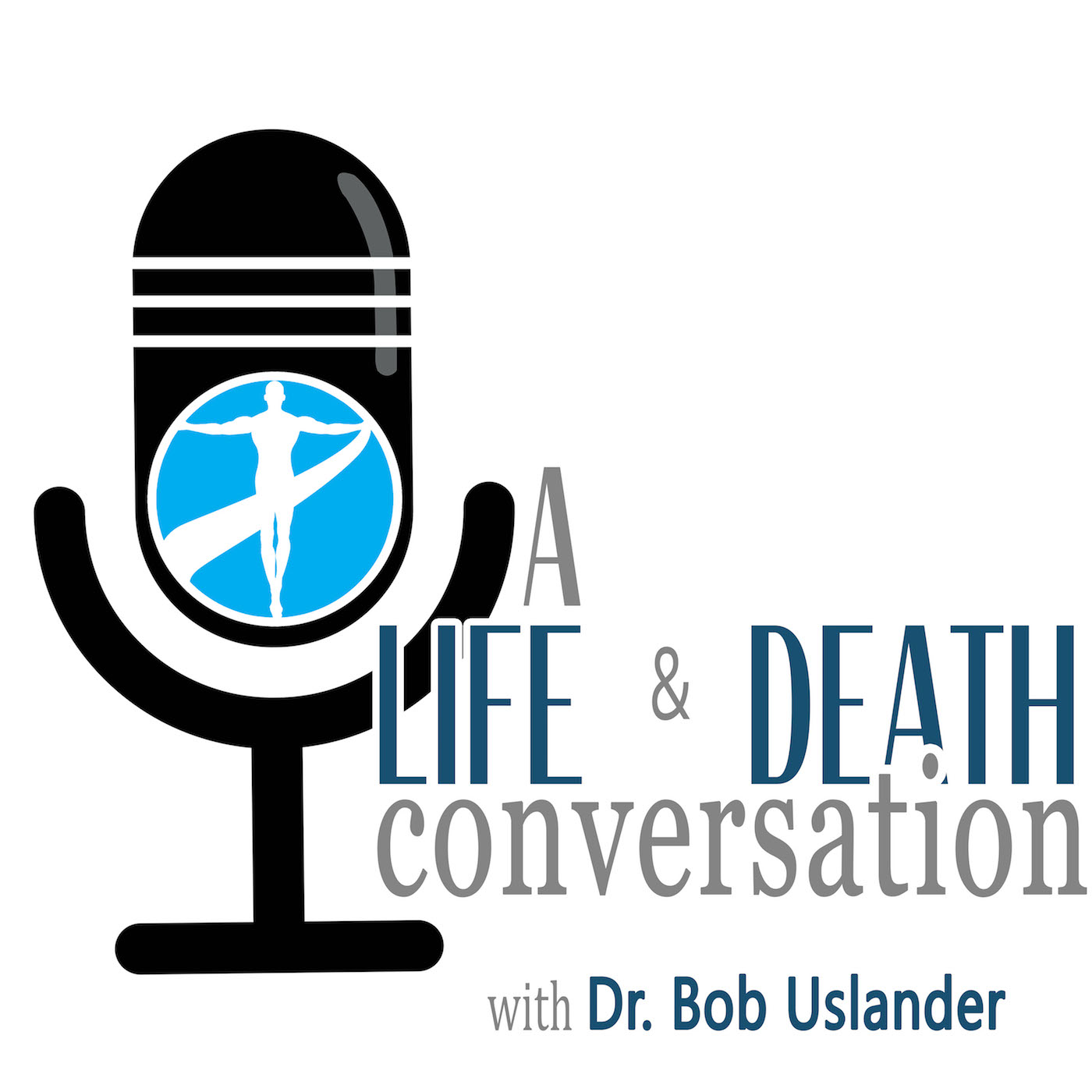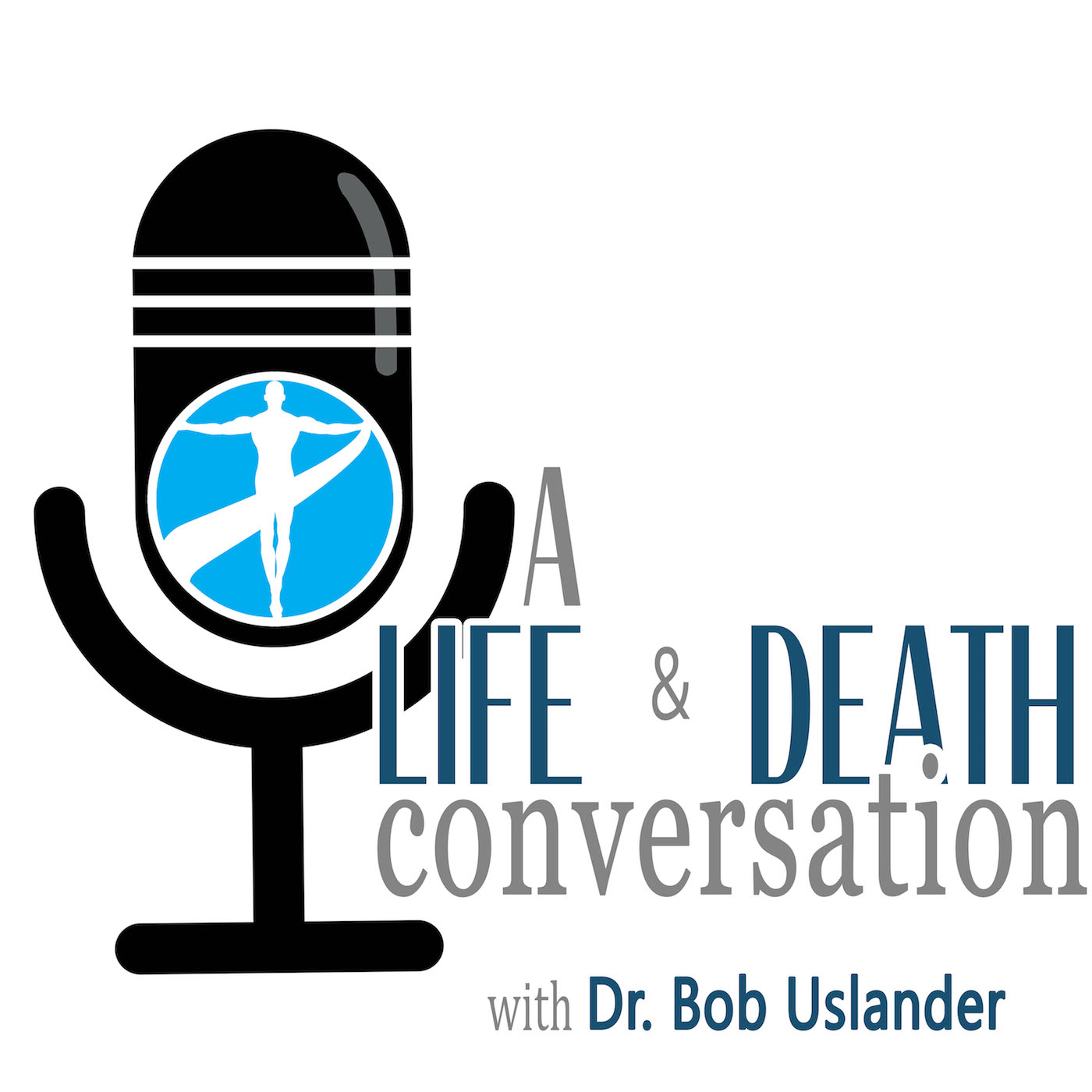Where You Can Go To Deal With Death, Bill Palmer Ep. 23
Description
Dr. Bob: My guest on today's podcast has been on a really interesting journey over the past several years. Bill Palmer is a successful executive coach and management consultant who lives in Oakland, California. After a personal experience with a loved one who died while being supported by an excellent hospice organization, Bill was inspired to come home to Oakland and start volunteering with other people on hospice. And then he began hosting Death Cafes.
To date, Bill's hosted over 75 Death Cafes for members of his community up in Oakland. If you're not familiar with Death Cafes, you will be after listening to this very informative podcast. Bill has had incredible insights through many, many hours spent with hundreds of people openly discussing death and dying. From the very practical aspects to the emotional and spiritual issues. On this podcast, he shares some of the insights that he's gained with us. I believe this can help you become more comfortable having those meaningful and really important conversations that you should be having with your loved ones and with yourself.
I hope you're as grateful for these insights and reminders as I was, as I was speaking to them. Bill, thank you so much for being willing to spend some time with us and share a bit of your experience and knowledge with the listeners.
Bill Palmer: Sure you're welcome.
Dr. Bob: You have an interesting life, I'm assuming. For some reason, you have chosen to dedicate yourself to helping people get more comfortable talking about death. How did that come about? What was the ... My understanding is that you're a business coach and that you're coaching people through different aspects of business and leadership. How do you become a Death Cafe leader from that place? What was your journey?
Bill Palmer: The journey really started actually, quite a few years ago when my mother was admitted as a hospice patient in Florida. She received incredibly good care at the Hospice of Palm Beach County where she lived at the time. As a business coach, and as an organizational development consultant, I was struck mostly by the wonderful care that she and my family received, but I was also struck by the incredible business alignment and sense of higher purpose in that hospice.
At the time, I thought it was unique. And since then I volunteered in several different hospices. I found that to be more the rule than the exception. Somehow, rather, and I don't recall exactly how I came across a guy named John Underwood who lived in London, and who was the founder of Death Café. It just seemed like a great idea to me at the time. I became a hospice volunteer because I wanted to give something back. It didn't especially require any special skill to be a hospice volunteer. Sometimes just sitting with somebody, visiting, doing a respite visit something like that.
But Death Cafe appealed to me because I could bring to bear some of the skills that I feel I have in terms of leading groups and speaking with individuals in an open and honest and kind of free, willing environment. So, I decided I would take John's advice and example and do a Death Café, which is actually pretty easy to do.
Dr. Bob: You have the model, right? He shared the model with you and ... From my understanding ... Tell us what a Death Cafe for people who don't really understand it.
Bill Palmer: Well, first of all, there's a website called www.deathcafe.com, and it gives a full explanation not only of what a Death Cafe is but how to start one if you want to in your own community. A Death Cafe is simply a free and open ... Free meaning there's no fee to attend, a group meeting of people, whoever wants to come, who want to talk about any aspect of death that interests them.
That could be anything from where do I get a will to, deep philosophical and religious concerns to, what are the regulations about scattering ashes to, my companion died 40 years ago and I'm still grieving to, my spouse died last week and I feel nothing. There's an incredible richness of experience and this is going to sound really strange, but they're actually fun. There's a lot of laughter in a Death Cafe. Some of that laughter is just nervousness about speaking about a taboo subject, but some of it is just appreciation of life.
If I could make one generalization about the Death Cafes, people leave feeling strongly that what they're doing in their lives right now, whether they're close to death or whether they feel like they're very far away, takes on an added significance if they can find a way to accept the fact that we're all going to die. One thing that surprised me about the 75 Death Cafes I've led is the number of people who apparently, intelligent, responsible, normal people who actually don't really think they're going to die.
Dr. Bob: They certainly act like that, right?
Bill Palmer: Yeah. Like I said, responsible, taxpaying, voting, civic-minded people who don't have a will, who don't have an advanced care directive, who've never discussed their wishes for their care towards the end of their lives. It is just an indication of the power of the taboo that people who in most every other aspect of their lives behave quite responsibly. But in this one area, even after they see and hear about the chaos that ensues if you die without a will, if you die without an advanced care directive, if you die or become disabled, even after they hear stories about that, it doesn't seem to get them.
Dr. Bob: Do you think that people are denying that they're going to die or that they just think somehow things are going to work out? They just don't want to ... They don't feel like they need to do the preparation because things just have a way of working out?
Bill Palmer: Well, I guess on an intellectual level, of course, they know they're going to die. But I think on some kind of emotional level, like a child, they don't really believe it. But I think it's probably a little bit of both, is just if you've never sat down and filled out an advance care directives, and you're using a good one, I'd ask some pretty tough questions.
For example, if you don't really know what resuscitation is like, you might think sure, resuscitate me. And if you find out what resuscitation is actually really like in many cases, you might decide something very different.
Dr. Bob: Right, in most cases. I think people, they watch TV shows, they watch ER or St. Elsewhere, these shows that depict somebody having a cardiac arrest. They do a couple of things and then a few seconds later they sit up and everyone's relieved, and it doesn't depict the absolute horror that ensues when somebody's doing chest compressions and ribs are breaking, and there's virtually no chance of survival in the vast majority of cases.
So, yeah, are those kinds of things discussed even at that kind of graphic level? Are people open to hearing those kinds of things when they show up for the Death Cafes?
Bill Palmer: Yeah, I think so. Anyone who leads a Death Cafe, including myself, leads it with a very light touch. There's no schedule of activities. There are no small groups. There are no icebreakers or anything like that. It's just open conversation. If somebody brings that up, people listen, and I think people are affected by it.
There is a great deal of information that gets shared. A common statement is, my family won't discuss my death with me. I will or someone else in the group will say, "Well, here are some great resources." The conversation project, for example, can give you some tips and guidelines and do's and don'ts for, how do you have this conversation with people that don't want to talk about it? It's not an easy thing.
So, I think there's that and there's a sense of comfort and community and that people find out well, gosh, I'm not alone in this. Other people feel this way too, or are afraid of the same thing, or have had a similar experience. I think it's comforting to people.
Dr. Bob: Yeah. Oh, it's rich, and like you say, it's a safe space. Interestingly, I haven't been to one for a bit, but when I went to a few Death Cafes here in San Diego, and they did break up into small grou







